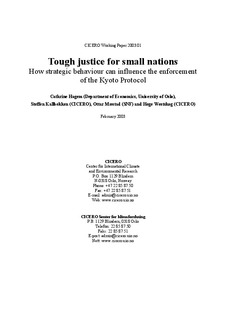| dc.contributor.author | Hagem, Cathrine | nb_NO |
| dc.contributor.author | Kallbekken, Steffen | nb_NO |
| dc.contributor.author | Mæstad, Ottar | nb_NO |
| dc.contributor.author | Westskog, Hege | nb_NO |
| dc.date.accessioned | 2014-03-17T14:31:25Z | |
| dc.date.available | 2014-03-17T14:31:25Z | |
| dc.date.issued | 2003 | nb_NO |
| dc.identifier.issn | 0504-452X | nb_NO |
| dc.identifier.uri | http://hdl.handle.net/11250/192346 | |
| dc.description.abstract | This paper looks at how strategic considerations may play a role in the decision of whether or not to impose sanctions on Parties who are not in compliance with their commitments to the Kyoto Protocol. A member of the Enforcement Branch might have an incentive to vote for sanctions towards one non-compliant country and not another even with the same violation. This implies that a certain composition of the members of the Enforcement Branch could decide to sanction one country and not another for the same relative non-compliance, while another composition might choose differently. We show that the expected effects on world market prices of sanctioning a country is likely to influence the decision of whether to carry out the sanctions or not. We find that it is likely to be easier to sanction countries where sanctions result in minor impacts on world market prices than those where the impacts are larger. Finally, we discuss an alternative design of the sanction mechanism in view of our results. | nb_NO |
| dc.language.iso | eng | nb_NO |
| dc.publisher | CICERO Center for International Climate and Environmental Research - Oslo | nb_NO |
| dc.relation.ispartof | CICERO Working Paper | nb_NO |
| dc.relation.ispartofseries | CICERO Working Paper;2003:01 | nb_NO |
| dc.title | Tough justice for small nations: How strategic behaviour can influence the enforcement of the Kyoto Protocol | nb_NO |
| dc.type | Working paper | nb_NO |
| dc.source.pagenumber | 10 | nb_NO |
| dc.identifier.cristin | 331204 | |
